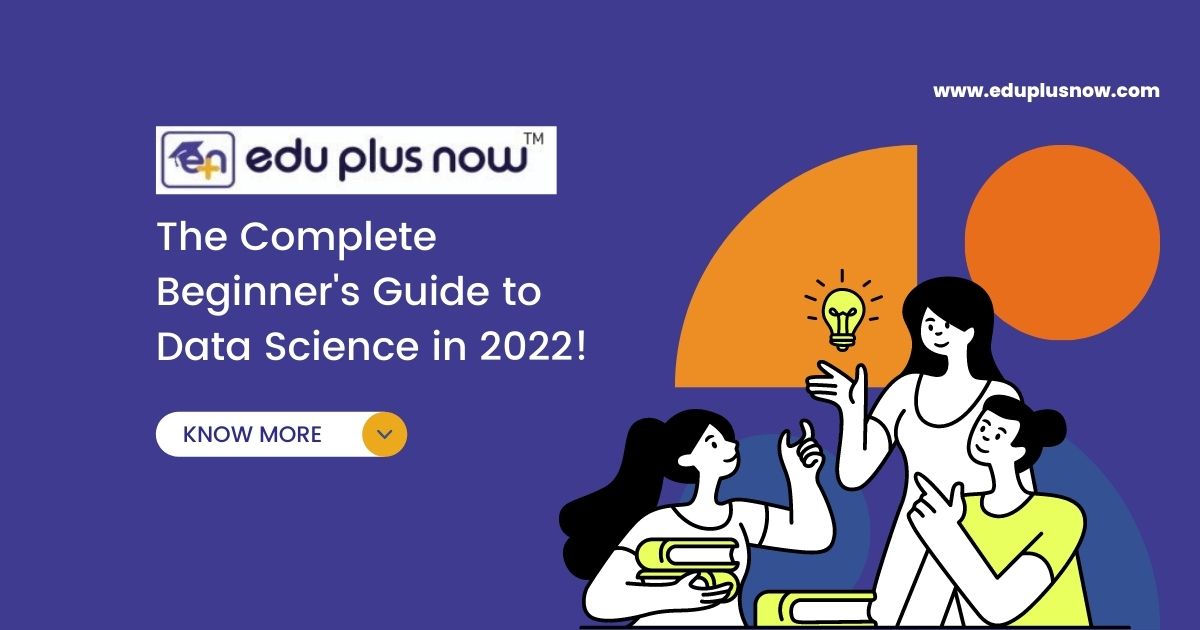
April 07 ,2022
A Complete Guide To Data Science
A job as a data science engineer is quite lucrative. Professionals who wish to advance their careers in data science can enrol in a variety of online data science course programs. Recruiters are constantly on the lookout for qualified candidates. However, the talents required may differ between firms and sectors.
Given the vast volumes of data created today, data science is a crucial aspect of many sectors, and it is one of the most contested subjects in IT circles. As a result, its popularity has expanded over time, and businesses have begun to use data science approaches to develop their businesses and boost consumer happiness.
The term "data scientist" was established in 2008, when businesses recognized the need for data experts capable of organizing and analyzing vast volumes of data.
Here is a complete introduction to data science and how anyone can start their career in it.
What Is Data Science?
Data science studies vast amounts of data using current tools and methodologies to discover previously unknown patterns, extract valuable information, and make business choices. To create prediction models, data scientists employ advanced machine learning algorithms.
The data used for analysis might come from various sources and be presented in a variety of ways. Data science incorporates numerous domains such as statistics, scientific methodologies, artificial intelligence (AI), and data analysis to extract value from data.
Data scientists use a variety of talents to evaluate data acquired from the web, cell phones, consumers, sensors, and other sources to obtain actionable insights. Data scientists must be inquisitive and results-oriented, with remarkable industry knowledge and communication abilities that enable them to convey highly technical outcomes to non-technical colleagues.
To create and evaluate algorithms, they must have a solid quantitative foundation in statistics and linear algebra and programming experience with an emphasis on data warehousing, mining, and modeling.
They must also be able to use critical technological tools and abilities, such as:
- R
- Python
- Apache Hadoop
- Map
- Reduce
- Apache Spark
- Cloud computing
- D3
- Apache Pig
- Tableau
- iPython notebooks
- GitHub
The data science lifecycle is divided into five separate stages, each with its own set of tasks:
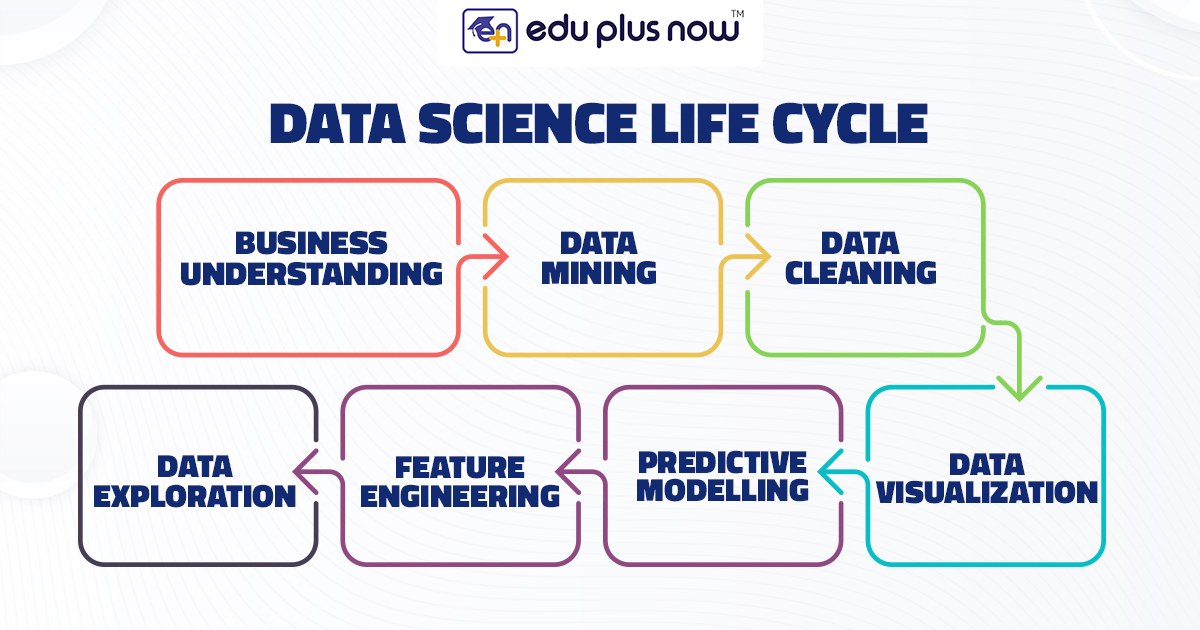
- Capturing:
Data acquisition, data entry, signal reception, and data extraction are all captured. This step entails collecting both organised and unstructured data.
- Maintaining:
Data Warehousing, Data Cleansing, Data Staging, Data Processing, and Data Architecture must all be maintained. This stage entails collecting raw data and converting it into a usable format.
- Processing:
Data mining, clustering/classification, modelling, and summarisation are all processes. Data scientists assess the produced data for patterns, ranges, and biases to see if it would be useful in predictive analysis.
- Analysing:
Exploratory/Confirmatory Analysis, Predictive Analysis, Regression, Text Mining, Qualitative Analysis This is the meat of the lifetime. This stage entails doing various analyses of the data.
- Communicating:
Data Reporting, Data Visualisation, Business Intelligence, and Decision Making are all ways to communicate. Analysts present the analyses in clearly legible forms such as charts, graphs, and reports in the last stage.
Many phrases relating to data mining, cleaning, analyzing, and interpreting are frequently used interchangeably, although they might really entail diverse skill sets and data complexity. Some of the roles include:
- Data Scientist:
Data scientists look into which questions need to be addressed and where they may get relevant data. They are well-versed in business and analytical abilities and the ability to mine, clean, and display data. Data scientists are employed by businesses to source, manage, and analyze enormous volumes of unstructured data. The findings are then consolidated and distributed to key stakeholders to influence strategic decision-making inside the firm.
- Data Analyst:
Data analysts serve as a link between data scientists and business analysts. They are given questions from an organization that needs to be answered, and then they arrange and analyze data to obtain results that correspond with high-level corporate strategy. Data analysts and online data analytics course graduates must be prepared to translate technical analyses into qualitative action items and successfully communicate their results to a wide range of stakeholders.
- Data Engineer:
Data engineers manage massive volumes of constantly changing data. They are responsible for designing, implementing, administering, and optimizing data pipelines and infrastructure used to convert and send data to data scientists for querying. Online data engineering courses graduates are prepared for all the challenges in the field.
- Data Architect:
Data architects and data engineers have similar tasks. They must both guarantee that the data is properly formatted and available to data scientists and analysts and increase the performance of the data pipelines. Furthermore, data architects develop and build new database systems to meet the needs of a specific business model. Finally, these database systems must be maintained by architects, both functionally and administratively. Architects, in other words, maintain track of the data and select who has access to, uses, and manipulates different areas of the data.
- Machine Learning Scientist:
A machine learning scientist investigates innovative data manipulation methods to create new algorithms. They are frequently associated with the R&D (research and development) department, and their work generally results in published research articles. Typically, machine learning experts work in academia rather than industry. Therefore, machine learning scientists may alternatively be referred to as research scientists or research engineers.
- Business Intelligence Developer:
Business intelligence developers create methods that allow firms to obtain the information swiftly and efficiently they require to make choices. To do so, BI developers must be at ease using new BI tools and building unique ones that deliver analytics and business insights. In addition, a BI developer's job is mainly business-oriented; thus, they should have an essential awareness of business strategy principles as well as the ins and outs of their company's business model.
- Database Administrator:
Many firms develop a database system based on unique business requirements, but the product is managed by the company that purchases it. A business will pay someone (or a team) to handle the database in such instances. A database administrator will maintain track of the data flow while producing backups and recoveries and monitor the database to ensure it runs properly. Administrators also control security by offering workers varied permissions based on their job needs and employment level.
- Other Technology Specialised Roles:
As data science grows, more specialised career categories will develop like AI professionals, deep learning specialists, NLP (natural language processing) specialists, and so on. This rapidly increasing speciality sector also applies to data scientists and analysts. These jobs will be specific to the business's duties and will most likely reduce the burden for generalist scientists and engineers.
Importance of Data Science
Data science is one of today's most exciting fields because businesses have a great wealth of data. Data volumes have expanded as contemporary technology has facilitated the generation and storage of ever-increasing quantities of information. It is believed that 90% of the world's data was produced in the previous two years.
For example, every hour, Facebook users post 10 million images. However, this data is frequently left unprocessed in databases and data lakes. The abundance of data gathered and saved by these technologies has the potential to revolutionise businesses and communities all across the world—but only if we can analyse it.
Data science identifies patterns and generates insights that companies may utilise to make better decisions and build more creative goods and services. However, perhaps most crucially, it allows machine learning (ML) models to learn from massive volumes of data provided to them, rather than depending just on business analysts to see what they can uncover from the data.
Data is the foundation of innovation, but the insights data scientists determine its worth can gather from it and then act on. As more data becomes available, huge IT businesses are no longer the only ones needing data scientists.
Organisations are using data science to transform data into a competitive advantage by enhancing goods and services. Examples of data science and machine learning applications include:
Determine customer attrition by studying call centre data so that marketing may take action to keep them.
Improve efficiency by evaluating traffic patterns, weather patterns, and other factors so that logistics businesses may improve delivery times and save costs.
Improve patient diagnoses by evaluating medical test data and reported symptoms, allowing clinicians to identify illnesses early and more efficiently.
Improve the supply chain by forecasting when equipment may fail.
Recognise suspicious behaviours and unnatural acts to detect fraud in financial services.
Increase revenue by making consumer suggestions based on prior purchases.
Many businesses have prioritised data science and are significantly investing in it. According to Gartner's latest poll of over 3,000 CIOs, analytics and business intelligence are the top distinguishing technologies for their firms. However, these technologies are viewed as the most strategic by the CIOs polled, and they are being invested inappropriately.
Future Of Data Science as A Career Opportunity
We live in a world driven by big data, and it is anticipated that the volume of global data will reach 180 zettabytes by 2025. However, this massive amount of data will necessitate domain specialists who can transform it into valuable insights using innovative technologies.
| Year | 2018 | 2019 | 2020 | 2021 | 2025 |
|---|---|---|---|---|---|
| Data Consumed Globally (Zettabytes) | 21 | 43 | 64.2 | 79 | 180 (Projected) |
As a result, the function of a data scientist is critical in assisting leadership teams in developing goals and plans. Data scientists use the power of technology to derive insights from massive amounts of data. They are equipped with an understanding of areas such as statistics, mathematics, and computer programming
Globally, organizations have realized that data is the most asset they have amassed throughout their operations. They are, however, unable to use it to its total capacity. According to AIM Research, there will be 137,870 positions in data science in India in June 2021, representing a 47.1 percent increase in open job requirements over June 2020.
India accounted for 9.4 percent of worldwide analytics job vacancies, up from 7.2 percent in January 2020. Furthermore, recruiting accounted for 9.4 percent of total worldwide analytics job vacancies, up from 7.2 percent in January 2020. According to Michael Page India's 'The Humans of Data Science' research, data science will produce around 11.5 million employment vacancies by 2026.
According to LinkedIn's Emerging Jobs Report, data science is the fastest expanding job sector globally, with a growth rate of over 650 percent since 2012 and a market expected to increase from $37.9 billion in 2019 to $230.80 billion by 2026. In addition, data assists businesses in assessing the market and consumer base, which is quickly becoming a vital asset nowadays.
Jobs in this profession are predicted to grow as firms increasingly recognize the actual potential of data scientists. According to the US Bureau of Labor Statistics, the growing relevance of data science would result in the development of nearly 11.5 million job vacancies by 2026. The future of Data Science may provide increased work prospects, mainly if the applicant is well-versed in the technology and trends used.
As a result, the need for students to be prepared with this sort of skill set and education grows. That is why it is critical to select the correct institute for furthering one's education.
Trends Emerging in Data Science
- Enhancements to Low Code and No-Code Technology
Companies are beginning to leverage out-of-the-box foundation models as they begin to apply AI in the business, significantly lowering the time-to-value for AI solutions in areas such as language, vision, and more. Artificial intelligence will have a significant influence on citizen development. Because of AI advancements in low-code technologies, anybody will become a citizen developer. According to TechRepublic research, more than half (47%) of businesses now use low-code and no-code in their operations. One-fifth of those who have not yet implemented the technology plan to do so within the following year. The adoption rate will rise in the coming years.
- TinyMCE and Small Data
The conception of "small data" has arisen as a paradigm to enable quick, cognitive examination of the most critical data in circumstances when time, bandwidth, or energy expenditure are critical. It is strongly related to the idea of edge computing. TinyML refers to machine learning algorithms designed to take up as little space as feasible to execute on low-powered hardware near the action. It will emerge in a growing number of embedded systems by 2022, including wearables, household appliances, autos, industrial equipment, and agricultural gear, making them all more innovative and more functional.
- AutoML
Short for automated machine learning, AutoML's goal is to build tools and platforms that anybody can use to construct their own ML apps. It is primarily intended for subject matter experts, whose specialized knowledge and insights place them in a perfect position to discover answers to the most pressing challenges in their respective industries but who frequently lack the coding skills required to apply AI to those problems. For example, a considerable percentage of data scientists' work is frequently spent on data purification and preparation operations that demand data skills and are frequently repetitive and tedious. AutoML includes automating those processes at its most basic, but it is increasingly also about developing models, algorithms, and neural networks.
- Customer Experience Driven by Data
It is about how corporations utilize our data to give us increasingly valued, worthwhile, or delightful experiences. It may imply less friction and bother in e-commerce, more user-friendly interfaces, and front end in the software we use, or less time waiting and being moved between departments when we contact customer care. The epidemic triggered a surge in investment and innovation in retail internet technologies. Finding innovative ways and strategies for utilizing this consumer data for improved customer service and novel customer experiences will be a priority for many data scientists in 2022.
- Augmented Data Analytics
By merging AI, machine learning, and natural language processing, augmented analytics automates the study of vast volumes of data. What used to be handled by a data scientist is now automated to provide real-time insights. As a result, companies are spending less time analyzing data and getting insights from it. The result is also more exact, resulting in better choices. Data from within and outside the firm may be combined using augmented analytics. With the advent of visual data discovery tools in recent years, AI and machine learning capabilities have been increasingly and directly deployed within analytics and BI systems to assist business users rather than just data professionals. In the following days, we will observe an increase in the use of Augmented Analytics.
- Deepfakes, Generative AI, and Synthetic Data
The underlying technology is known as generative AI, and it seeks to produce or build something that does not exist. The arts and entertainment industries have swiftly embraced generative AI. We can anticipate it exploding into many different sectors and use cases by 2022. For example, it may be used to train image recognition algorithms to detect tumor symptoms that are uncommon and seldom recorded in medical photos. It may also be used to develop language-to-image skills, allowing an architect, for example, to generate concept pictures of a structure just by expressing how it would seem in words.
- Technology Convergence
The pillars of digital transformation include artificial intelligence (AI), the internet of things (IoT), cloud computing, and ultrafast networks such as 5G. All these technologies exist alone, but they can accomplish much more when coupled. For example, artificial intelligence enables IoT devices to function intelligently, engaging with one another with as little human intervention as feasible. 5G and other ultra-fast networks will enable faster data transmission and enable new forms of data transport to become ubiquitous. Data scientists' AI algorithms play an essential part in this, from routing traffic to guaranteeing optimal transfer rates to automating environmental controls in cloud data centers.
Why You Should Consider edu plus now for Your Data Science Education
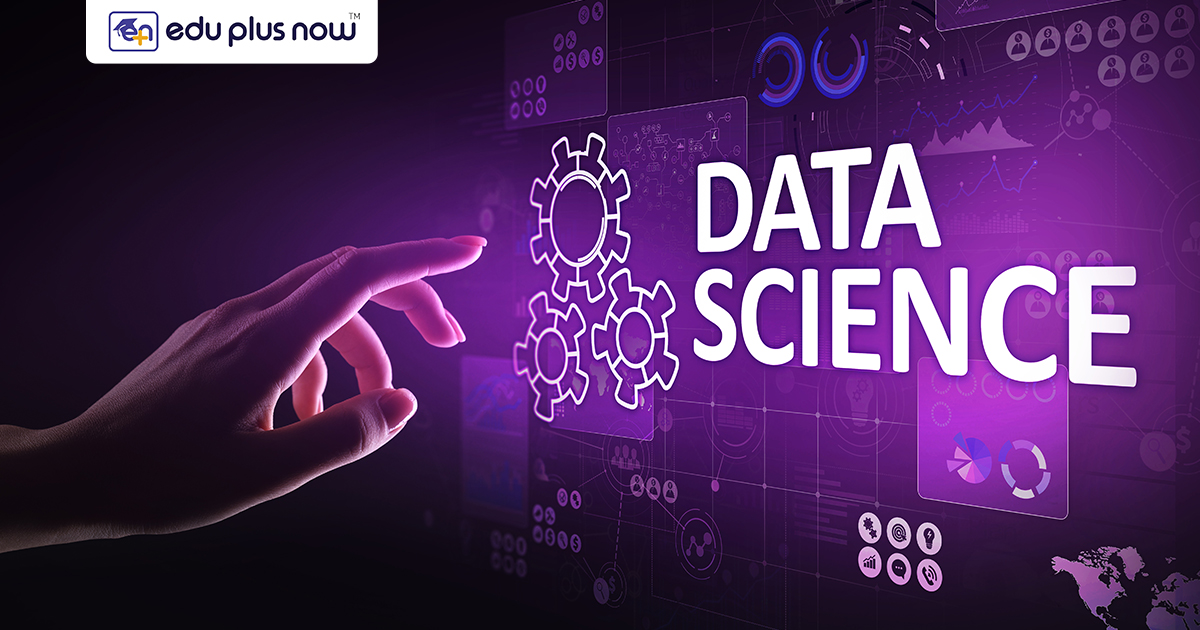
Obtaining an online education for such a complex subject is complicated. The main problem is that we do not know where to go for information. Online sources are no better, and they are usually untrustworthy. Furthermore, even online, just a few respectable universities provide a skill-specific course of study.
If you are seeking a decent online data science course, you will most likely come across several programs that either teach the fundamentals or promise a lot. But unfortunately, it is often unusual for institutes to keep their commitments.
It would be beneficial to investigate the institutes to determine what you value and whether they can provide it. edu plus now, for example, is one of Pune's most well-known institutes. Their PG Program in Data Science is one of the most well-received.
The curriculum is intended to educate students on the principles of the subject while also preparing them for problems they may face in the field. Here are some of the most essential benefits that edu plus now provides with the top online Data Science program for students:
- Networking Opportunities:
One of the major advantages of pursuing data science with edu plus now is the networking options available to students. Networking with leaders and peers in your field helps you gain insights and advice from those who have already achieved success. You could also learn about pertinent news and upcoming developments in your neighborhood. Networking also teaches you how to engage correctly with people.
- In-Depth Understanding of Concepts:
Teachers and lecturers have areas of competence in the disciplines for which they are qualified. These teachers use their topic knowledge to communicate crucial information to students. Experts in the area help students obtain a thorough grasp of subjects. They learn expertise not found in books and advance their status in the industry.
- Industry-Oriented Curriculum:
Expert information gathered and categorized by industry specialists is vital to the success of edu plus now graduates. A solid curriculum will give a solid basis for students to build their skills and careers on. The data science program at edu plus now is constantly evolving, with business and academic experts' input. It enables students to keep current with industry developments.
- Hybrid Pedagogy:
A well-rounded education guarantees that students learn from books and through hands-on experience. Aside from regular academic work, edu plus now offers conclaves and seminars to help students learn more. Practical learning modalities such as real-time application of coursework and case studies are recommended to assist successful learning.
- Placement Opportunities:
Finally, students deserve the most extraordinary possibilities to begin their careers. edu plus now gives students a well-deserved opportunity to influence their future. Students will get job offers from the industry's most recognizable businesses, ensuring that their career gets off to the greatest possible start. The edu plus now placement cell assists students in pursuing their desired careers in any industry.
The Data Science course from edu plus now is ideal for working professionals and recent graduates who wish to pursue a career in data science. The student will learn to use data engineering principles such as the Hadoop framework and ecosystem, big-scale data processing with Spark, constructing data pipelines with Kafka, and comprehending the AWS cloud. In addition, statistics and analytics concepts, machine learning algorithms, R, deep learning with TensorFlow, and data visualization using Tableau and PowerBI are all covered.
Students who participate in the online data science course will receive 400+ hours of intensive online instruction. These lecture recordings will be available long after the course has ended. Students will also get access to edu plus now's Online Learning Management System, which includes live online lectures, lecture recordings, study material, assignments, and various other features.
The online data analytics course program is designed to educate students on the fundamentals of the topic while also preparing them for potential challenges in the area. Students may review and re-understand what they have studied in a comfortable and accessible manner by accessing video lectures at their leisure.
Furthermore, the Indian Statistical Institute is an associate partner with edu plus now. They offer certification, which adds to the program's value. Using real-world business examples in projects offered by instructors at Edu plus now allows students to put their abilities and knowledge to the test in real-time.
After completing the online data engineering course, students are given placement assistance to help them begin their careers with outstanding prospects. Students at edu plus now receive full support from the institute, its employees, and its facilities to attain their professional objectives.
Students from 12 countries rely on edu plus now to help them accomplish their career objectives. Explore the benefits of edu plus now and the online data science course to give your career that great start you deserve!
Previous
Get Free Career Advice
Related Articles
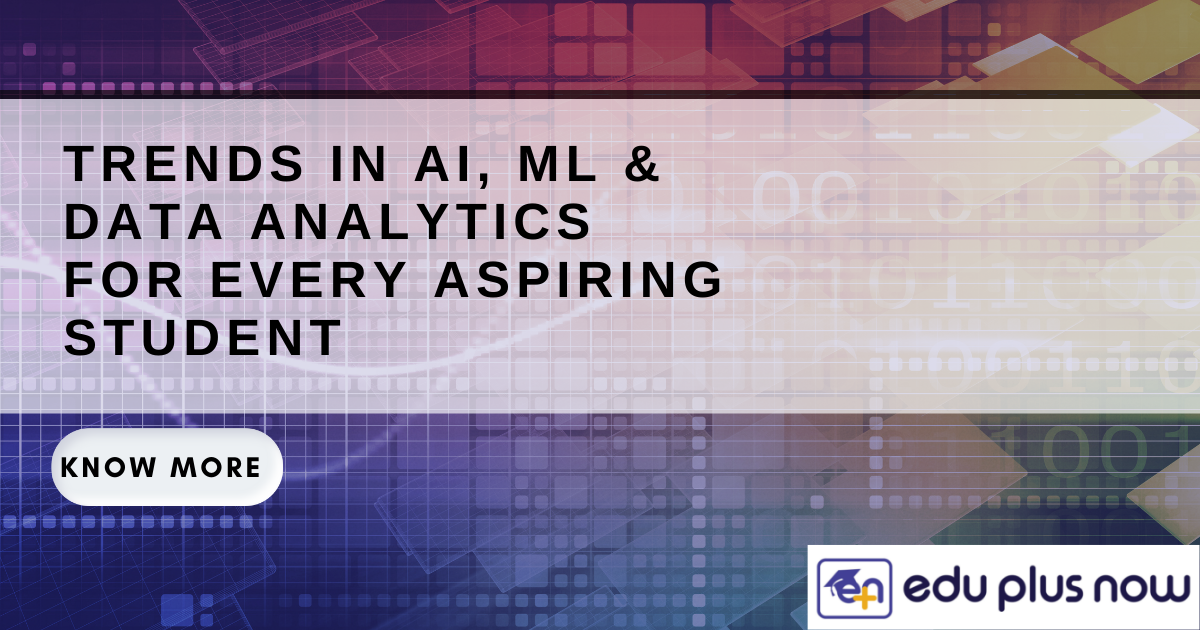
14 January, 2022
7 Trends in AI, ML & Data Analytics for Every Aspiring Student to Know
Data analytics is a complicated field as it is both science and art. Therefore, a competent data analytics professional's knowledge and experience are required to evaluate this critical data successfully...
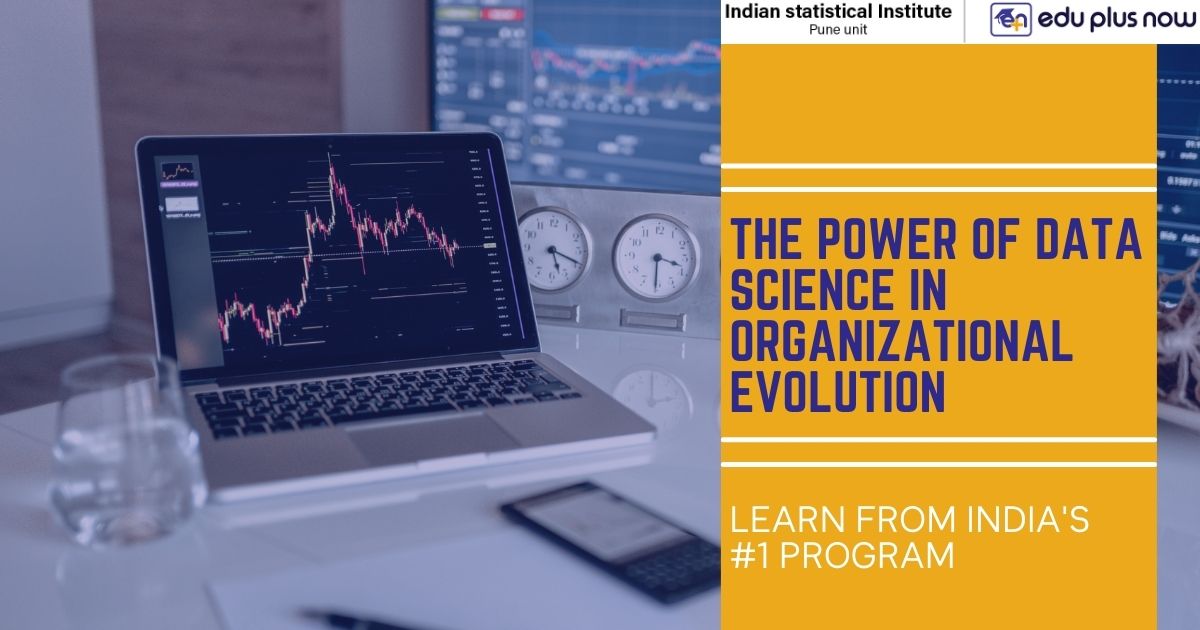
12 November, 2021
A Guide to Data Science for an Organizational evolution
Data Science deals with data and data only. Quest goes! Is there anything that is not data? Ponder a little. Skip the question. We all know the...


